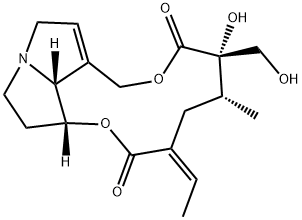480-54-6
中文名稱
倒千里光堿
英文名稱
RETRORSINE
CAS
480-54-6
分子式
C18H25NO6
分子量
351.39
MOL 文件
480-54-6.mol
更新日期
2025/02/13 09:04:46
 480-54-6 結(jié)構(gòu)式
480-54-6 結(jié)構(gòu)式
基本信息
中文別名
逆丙氨酸倒千里光堿
探討倒千里光堿
倒千里光堿(>90%,BC)
英文別名
RetrosineRETRORSIN
RETRORSINE
Retrorcine
β-Longilobine
RETRORSINE(AS)
BETA-LONGILOBINE
cis-retronecicacidesterofretronecine
16-dione,12,18-dihydroxy-senecionan-1
12,18-DIHYDROXYSENECIONAN-11,16-DIONE
所屬類別
分析化學(xué):食品和化妝品標準品物理化學(xué)性質(zhì)
熔點208-211 °C(lit.)
比旋光度D18 -17.6° (c = 1.99 in ethanol)
沸點485.2°C (rough estimate)
密度1.32±0.1 g/cm3 (20 ºC 760 Torr)
折射率1.5100 (estimate)
儲存條件?20°C
酸度系數(shù)(pKa)12.00±0.40(Predicted)
形態(tài)neat
顏色White to off-white
Merck13,8253
InChIKeyBCJMNZRQJAVDLD-VMOBWIEOSA-N
CAS 數(shù)據(jù)庫480-54-6
(IARC)致癌物分類3 (Vol. 10, Sup 7) 1987
EPA化學(xué)物質(zhì)信息Retrorsine (480-54-6)
安全數(shù)據(jù)
警示詞危險
危險性描述H300+H310+H330
危險品標志T
危險類別碼25
安全說明22-36/37/39-45
危險品運輸編號1544
WGK Germany3
RTECS號VH7525000
危險等級6.1(a)
包裝類別II
毒害物質(zhì)數(shù)據(jù)480-54-6(Hazardous Substances Data)
倒千里光堿價格(試劑級)
| 報價日期 | 產(chǎn)品編號 | 產(chǎn)品名稱 | CAS號 | 包裝 | 價格 |
| 2025/02/08 | HY-N6638 | 倒千里光堿 Retrorsine | 480-54-6 | 1 mg | 1800元 |
| 2025/02/08 | HY-N6638 | 倒千里光堿 Retrorsine | 480-54-6 | 5mg | 4500元 |
| 2024/11/08 | HY-N6638 | 倒千里光堿 Retrorsine | 480-54-6 | 10mg | 2800元 |
常見問題列表
生物活性
Retrorsine 是一種天然存在的有毒吡咯利西啶生物堿。Retrorsine 可以與 DNA 結(jié)合,抑制肝細胞的增殖能力。Retrorsine 可用于肝細胞損傷的研究。體外研究
Retrorsine (60-240 μM; 24 hours) significantly reduces HSEC-CYP3A4 cells viability and GSH levels, and increases formation of pyrrole-protein adducts.
Cell Viability Assay
| Cell Line: | HSEC-CYP3A4 cells |
| Concentration: | 60 μM, 120 μM , 240 μM |
| Incubation Time: | 24 hours |
| Result: | Significantly decreased cell viability. |
體內(nèi)研究
Retrorsine (30 mg/kg; i.p.; twice) impairs liver regeneration in the PBL model not only by an S or G2/M phase block, but also by a block located before the G1/S transition of the cell cycle.
| Animal Model: | Male Wistar rats (180±20 g), portal branch ligation (PBL) model |
| Dosage: | 30 mg/kg |
| Administration: | Intraperitoneal injection, twice, separated by 2-week interval |
| Result: | Strongly impaired the liver weight gain, protein and DNA synthesis as well as induction of cell cycle related proteins in the regenerating lobes after PBL. |
